Experiential Learning: Difference between revisions
Tanvivartak (talk | contribs) |
Tanvivartak (talk | contribs) |
||
| Line 6: | Line 6: | ||
[[File:Kolbs Learning Stages.jpg|thumb|300x300px|'''Kolb's Learning Stages''']] | [[File:Kolbs Learning Stages.jpg|thumb|300x300px|'''Kolb's Learning Stages''']] | ||
David Kolb <ref> Kolb, D. (1984). Experiential learning: Experience as the source of learning and development. New Jersey7 Prentice Hall. </ref> proposed that experience was critical in developing knowledge construction, as learning occurs through discovery and active participation. Kolb defined learning as “the process whereby knowledge is created through the transformation of experience” (Kolb, 1984). | |||
According to Kolb's experiential learning model, there are four stages central to experiential learning. | According to Kolb's experiential learning model, there are four stages central to experiential learning. | ||
# '''Concrete Experimentation''' - | # '''Concrete Experimentation''' - In this stage, each learner engages in an activity or task, which may be completely new or a reimagined experienced of the past. For learning to take place, the student must actively engage in the task | ||
# ''' | |||
# '''Reflective Observation -''' - The learner in this stage steps back from the task to reflect on the task experience. This stage allows the learner to analyse the findings of the data and information collected while performing the task and reflecting on it. | |||
# '''Abstract Conceptualization''' | # '''Abstract Conceptualization''' | ||
# '''Active Experimentation''' | # '''Active Experimentation''' | ||
= Example = | = Example = | ||
Revision as of 21:43, 23 February 2023
Overview
Experiential learning builds on the work of Piaget, Lewin and Dewey [1]. It consists of several models that stress the importance of direct experience and reflective observation
Kolb's Experiential Learning Model
David Kolb [2] proposed that experience was critical in developing knowledge construction, as learning occurs through discovery and active participation. Kolb defined learning as “the process whereby knowledge is created through the transformation of experience” (Kolb, 1984).
According to Kolb's experiential learning model, there are four stages central to experiential learning.
- Concrete Experimentation - In this stage, each learner engages in an activity or task, which may be completely new or a reimagined experienced of the past. For learning to take place, the student must actively engage in the task
- Reflective Observation - - The learner in this stage steps back from the task to reflect on the task experience. This stage allows the learner to analyse the findings of the data and information collected while performing the task and reflecting on it.
- Abstract Conceptualization
- Active Experimentation
Example
Evidence
Implications and Design Critique
Conclusion
References
- ↑ Nielsen-Englyst, L. (2003). Game design for imaginative conceptualisation. Proceedings of the international workshop on experimantal interactive learning in industrial management, Allborg (pp. 149 – 164)
- ↑ Kolb, D. (1984). Experiential learning: Experience as the source of learning and development. New Jersey7 Prentice Hall.

